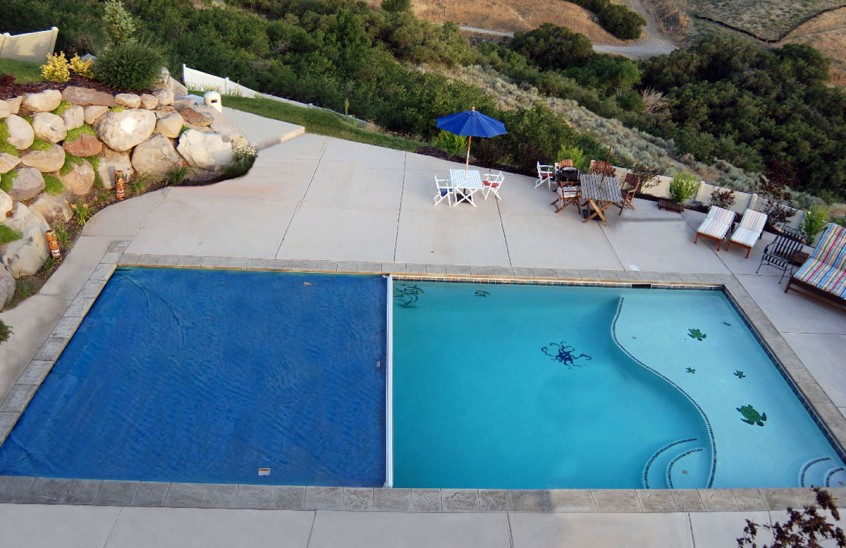With the savage winter a memory, Lisa Busso-Raglievich last weekend finally got to test her swimming pool’s new saltwater chlorination system, and she quickly was convinced it was a good use of $2,000.
No stinging eyes. No need to store bottles of chlorine in the shed. No more trips to the pool store to test the water’s contents.
“The expense of chlorine is an expense,” Busso-Raglievich, 46, of Freehold Township said, ticking off all that went into maintaining the pool.
The swimming pool season has arrived, and some Jersey Shore homeowners are converting from their traditional chlorine sanitation systems to saltwater-based systems. The new system is equally effective at killing viruses and bacteria, and it is safer to operate, one chemist said, even though it doesn’t eliminate maintenance altogether.
The trend comes just in time for the swimming pool industry that was battered during the recession. Pool companies coming out of the recession are finding work not necessarily building new pools, but converting existing ones.
“There’s still issues with home-equity and financing,” said Steven Metz, an owner of Central Jersey Pools in Freehold Township. “But people who have pools have been upgrading them.”
Pool as a gathering spot
For many Central New Jersey homeowners, the backyard swimming pool is the centerpiece of summer. Busso-Raglievich has had the pool since buying the home in 1995. She lives there with her husband, Jeff, daughter, Marissa, and cockapoo, Jack. And the pool has been a gathering spot both for the family and their friends.
Like most pools, it was kept clean with the help of chlorine, a chemical that is a strong disinfectant, even though it can redden the eyes of people who swim too long, said Meg Fisher, medical director of the Unterberg Children’s Hospital at Monmouth Medical Center in Long Branch.
But it could be a hassle. Busso-Raglievich remembers spilling chlorine on her clothes, ruining them; searching for different chemicals to break up chlorine locks; striving to understand pH levels; and being overwhelmed at times from the fumes coming from the automatic chlorinator.
With the prompting of friends who told her about the saltwater chlorination systems they installed, she and her husband decided to follow suit.
“It’s like a bath of silk,” said Christine Iessi, 45, of Matawan, and a friend of Busso-Raglievich’s. Her pool, built five years ago, came with a saltwater chlorination system. “There’s no issue with anybody’s hair turning green,” she said. “It doesn’t burn the eyes. It feels like you’re in a bath of Evian.”
With swimming pools come myths. For example, the chlorine odor that is a staple of summertime is generated not because there is too much chlorine, but because there is not enough, said Kevin Olsen, a chemist and instrumentation specialist at Montclair State University.
And saltwater chlorination doesn’t turn a swimming pool into a replica of the Dead Sea, a body of water so salty and buoyant that it is impossible to drown. Instead, the pool is sterilized through an electric reaction to salt, or sodium chloride, and water.
“You’re not really changing anything in terms of the chemistry that’s killing the bacteria and viruses and algae,” Olsen said. “You’re generating the sterilizing agent in a different manner.”
Struggling pool industry
The technology is widespread in Australia, he said, where 95 percent of pools have a saltwater chlorination system. But it is welcome technology in the U.S., where the swimming pool industry has struggled.
In fact, the industry is a good barometer of the overall economy. The number of new in-ground pools dropped from 176,000 in 2005 (when Americans were tapping into the rising equity of their homes to pay for home-improvement projects) to 54,000 in 2009 (when the housing bubble burst), according to the Association of Pool and Spa Professionals, an Alexandria, Virginia-based trade group.
The number has remained relatively stable since then – a sign that homeowners still don’t have lots of financing options.
But industry officials said they are finding a new market in consumers converting their old pools to saltwater chlorination. And those who make the shift can see their maintenance cost fall from more than $500 a year to about $100 a year, said Chas Bogardus, service manager of Budd’s Pools and Spas in Deptford, Gloucester County.
“But people aren’t generally going to saltwater because it saves them money,” Bogardus said. They do it “because the water feels nice, you don’t have the odor, and it is easy and simple to run.”
Not that it’s without hazards. Saltwater that leaks out of the system can kill grass and damage plants, Olsen noted.
But Busso-Raglievich sounded as if she would take that tradeoff.
When Central Jersey Pools came to change the liner in the 15-year-old pool, they decided to convert the system. With the weather finally warm last weekend, she went for a swim, and she said she could feel the difference. She felt softer.
“I feel in the long run, it’s going to be so much better,” she said.
This article was written by Michael L. Diamond and originally appeared on Asbury Park Press [link].
